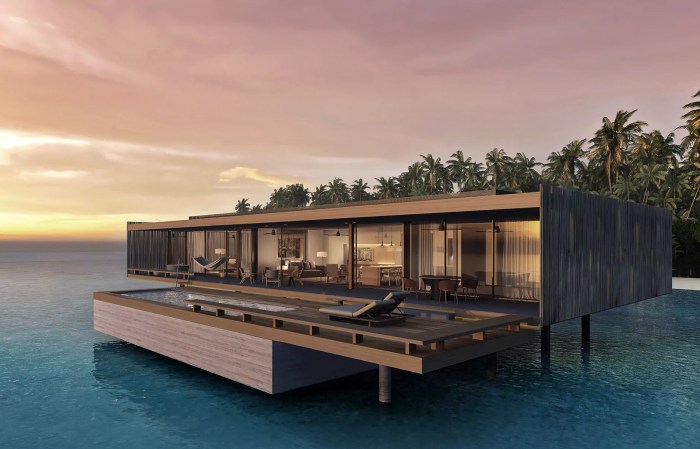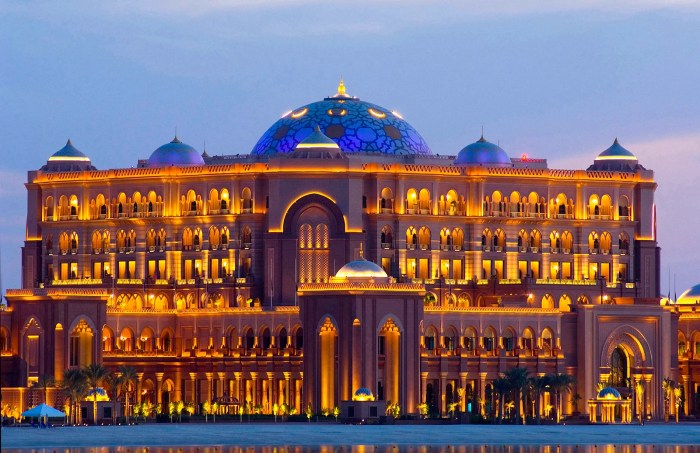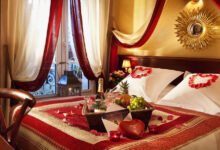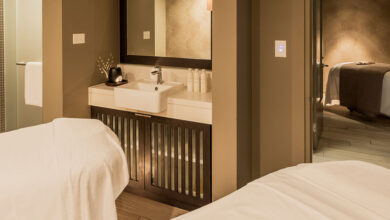Luxury Hotels A Refined Experience
Luxury Hotels represent the pinnacle of hospitality, offering more than just a place to stay; they curate an experience. From meticulously designed interiors to unparalleled service, these establishments cater to discerning travelers seeking exceptional comfort and personalized attention. This exploration delves into the defining characteristics of luxury hotels, examining their target audience, amenities, design, and commitment to sustainability.
We’ll uncover what sets these hotels apart, exploring the unique services and amenities that contribute to their allure. We’ll also consider the evolving role of sustainability in the luxury hotel market and how these establishments are adapting to meet the demands of a conscious traveler.
Defining Luxury Hotels
Luxury hotels represent the pinnacle of the hospitality industry, offering an unparalleled level of service, comfort, and exclusivity. They cater to discerning travelers seeking more than just a place to sleep; they desire an immersive experience that transcends the ordinary. This definition distinguishes them from other hotel types, which prioritize different aspects, such as affordability, practicality, or specific amenities.
Key characteristics of a luxury hotel experience include impeccable service, personalized attention, exquisite accommodations, and exceptional amenities. These elements combine to create an atmosphere of sophistication, tranquility, and unparalleled comfort. The level of detail and personalization are crucial; it’s not just about providing a service, but about anticipating and exceeding guest expectations at every turn.
Luxury Hotel Characteristics Across Geographic Regions
Luxury hotel standards vary across different geographic regions and cultures, reflecting local tastes and preferences. For instance, a luxury hotel in Japan might emphasize traditional aesthetics and meticulous attention to detail, while a luxury hotel in the Caribbean might focus on relaxation, outdoor activities, and vibrant local culture. European luxury hotels often highlight history and heritage, incorporating classical design elements and personalized service steeped in tradition.
In contrast, some Middle Eastern luxury hotels showcase opulent grandeur and lavish amenities, often reflecting the region’s rich cultural heritage. These variations demonstrate that the definition of “luxury” itself is fluid and context-dependent.
Service Standards in Luxury Hotels
Exceptional service is the cornerstone of the luxury hotel experience. This extends beyond basic hospitality and encompasses anticipating guest needs, providing personalized recommendations, and resolving issues proactively and discreetly. Staff are highly trained and possess an in-depth knowledge of the hotel, local area, and guest preferences. They exhibit professionalism, attentiveness, and a genuine desire to create a memorable experience.
This often includes 24-hour concierge services, personalized butler service, and multilingual staff capable of catering to an international clientele. Furthermore, luxury hotels often offer bespoke services tailored to individual guest requirements, ranging from private dining experiences to arranging exclusive excursions.
Key Differentiators of Luxury Hotels
| Feature | Description | Example | Competitive Advantage |
|---|---|---|---|
| Accommodation | Spacious, exquisitely designed rooms and suites with high-end amenities. | A suite with a private balcony overlooking the ocean, a marble bathroom with a soaking tub, and a butler service. | Enhanced comfort and exclusivity. |
| Amenities | Exceptional facilities such as spas, fitness centers, swimming pools, fine-dining restaurants, and exclusive lounges. | A world-class spa offering a range of treatments, a Michelin-starred restaurant, and a private beach club. | Provides a comprehensive and luxurious experience. |
| Service | Impeccable and personalized service from highly trained staff. | 24-hour concierge service, personalized butler service, and multilingual staff. | Creates a memorable and personalized experience. |
| Location | Prime locations in desirable destinations. | A hotel situated on a private beach in the Maldives or overlooking Central Park in New York City. | Provides access to exclusive experiences and attractions. |
| Technology | Integration of advanced technology to enhance guest experience. | Smart room controls, high-speed internet, and in-room entertainment systems. | Enhances convenience and comfort. |
Target Audience of Luxury Hotels
Luxury hotels cater to a discerning clientele whose travel experiences are driven by a desire for exclusivity, personalized service, and unparalleled comfort. Understanding this target audience is crucial for crafting effective marketing strategies and ensuring a consistently high level of guest satisfaction. This segment delves into the demographics, psychographics, motivations, and expectations of luxury hotel guests.
The primary demographic of luxury hotel guests typically includes high-net-worth individuals (HNWIs) and ultra-high-net-worth individuals (UHNWIs), aged 35-65, with significant disposable income. However, this is not a rigid definition; increasingly, younger, successful entrepreneurs and professionals also constitute a substantial portion of this market. Psychographically, these guests value privacy, personalized attention, authenticity, and unique experiences. They are often well-traveled, sophisticated, and appreciate curated offerings rather than mass-market solutions.
Motivations and Expectations of Luxury Travelers
Luxury travelers are motivated by a desire for exceptional experiences that transcend the ordinary. They seek more than just a place to sleep; they seek a transformative journey, a curated escape, and a chance to indulge in the finer things in life. Their expectations are correspondingly high, encompassing impeccable service, exquisite amenities, and a seamless, personalized experience from the moment of booking to check-out.
They expect intuitive service anticipating their needs before they are even voiced. This might involve remembering their preferred room temperature, offering bespoke dining options, or arranging exclusive activities tailored to their interests.
Marketing Strategies for Attracting Luxury Travelers
Marketing to luxury travelers requires a sophisticated and targeted approach. Generic advertising won’t suffice. Instead, luxury hotels leverage exclusive partnerships with luxury brands, bespoke concierge services, personalized email marketing campaigns based on past stays and preferences, and targeted advertising on high-end lifestyle publications and platforms. For example, a hotel might partner with a renowned chef for a limited-time culinary experience or offer a private helicopter tour of a nearby scenic location.
These initiatives focus on creating exclusivity and desirability.
Profile of a Typical Luxury Hotel Guest
A typical luxury hotel guest might be a successful entrepreneur traveling for business or pleasure, or a discerning couple celebrating an anniversary. Their travel habits often include booking well in advance, favoring direct bookings rather than third-party platforms, and appreciating personalized recommendations for local experiences. They value exclusivity and privacy, often choosing suites or villas with private amenities.
They appreciate authentic local experiences and are less interested in mass-tourism attractions. They are digitally savvy and utilize online channels for research and booking, but also appreciate the personal touch of a dedicated concierge.
Top Five Desires of a Luxury Hotel Guest
The following list highlights the core desires that consistently rank highly amongst luxury hotel guests:
- Impeccable Service: Anticipatory, personalized, and discreet service is paramount. This extends to every aspect of the stay, from check-in to departure.
- Privacy and Exclusivity: A sense of seclusion and privacy is highly valued, whether it’s a secluded villa, a private pool, or simply a quiet, uncrowded atmosphere.
- High-Quality Amenities: Luxury guests expect top-of-the-line amenities, from luxurious bedding and toiletries to state-of-the-art technology and spa facilities.
- Unique Experiences: Opportunities for unique and unforgettable experiences, such as private tours, exclusive events, or curated activities, are highly sought after.
- Personalized Attention: Guests appreciate a level of personalized attention that makes them feel valued and appreciated as individuals, not just as customers.
Amenities and Services in Luxury Hotels
Luxury hotels go above and beyond standard accommodations, offering a curated experience designed to pamper and impress their guests. The amenities and services provided are integral to defining the luxury experience and differentiating one hotel from another. This extends beyond the basics of comfortable rooms and friendly staff to encompass a wide array of personalized services and exclusive access.
The range of amenities and services offered by luxury hotels is extensive and constantly evolving. They typically include luxurious accommodations with high-thread-count linens and premium toiletries, exceptional dining experiences with Michelin-starred restaurants or innovative culinary concepts, 24-hour concierge services catering to every guest need, state-of-the-art fitness centers and spas with comprehensive wellness programs, and personalized butler services for an elevated level of personal attention.
Beyond these core offerings, many luxury hotels provide access to exclusive experiences, such as private yacht charters, chauffeured car services, and curated city tours. The level of personalization and attention to detail is what truly sets these hotels apart.
Comparison of Amenities Across Top Luxury Hotel Brands, Luxury Hotels
While the core offerings of luxury hotels are similar, subtle differences in amenities and service styles distinguish top brands globally. For example, the Four Seasons is renowned for its impeccable service and personalized attention, often going the extra mile to anticipate guest needs. The Ritz-Carlton emphasizes a classic, elegant experience with a focus on tradition and refined details.
The Mandarin Oriental is known for its stylish, contemporary design and its emphasis on wellness and holistic experiences. These differences in brand identity are reflected in the specific amenities and services offered. The Four Seasons might prioritize bespoke experiences tailored to individual guest preferences, while the Ritz-Carlton might focus on providing a consistently luxurious and predictable experience. The Mandarin Oriental might highlight its unique spa treatments and healthy dining options.
Technology Integration in Luxury Hotel Services
Technology plays a significant role in enhancing the luxury hotel experience. Many hotels utilize mobile apps to allow guests to control room features (lighting, temperature, entertainment), order room service, book spa treatments, and access concierge services. Smart room technology, such as voice-activated assistants and automated check-in/check-out systems, streamline the guest journey and enhance convenience. Facial recognition technology is also being explored for seamless access to hotel facilities and personalized service.
Furthermore, data analytics are employed to personalize guest experiences, anticipating needs and preferences based on past stays and expressed preferences. This allows hotels to deliver highly customized and anticipatory service.
Amenities and Services Comparison Table
The following table compares the amenities and services offered by three leading luxury hotel brands: Four Seasons, Ritz-Carlton, and Mandarin Oriental.
| Hotel Brand | Accommodation Features | Dining & Beverage | Wellness & Spa |
|---|---|---|---|
| Four Seasons | High-thread-count linens, premium toiletries, personalized room service, spacious accommodations | Michelin-starred restaurants, in-room dining, curated wine lists, innovative cocktail programs | State-of-the-art fitness centers, luxurious spas with a wide range of treatments, personalized wellness programs |
| Ritz-Carlton | Elegant décor, classic furnishings, personalized butler service, high-tech amenities | Fine dining restaurants, afternoon tea service, signature cocktails, extensive wine cellars | Spa treatments with traditional techniques, fitness classes, wellness consultations, relaxation areas |
| Mandarin Oriental | Modern design, luxurious amenities, stunning city views, high-speed internet | Trendy restaurants, stylish bars, healthy dining options, unique culinary experiences | Holistic wellness programs, yoga and meditation classes, traditional Asian spa treatments, tranquil spa environments |
Unique Selling Proposition of Luxury Hotel Spas and Wellness Facilities
The spa and wellness facilities are a crucial component of the luxury hotel experience, often serving as a unique selling proposition. Luxury hotels differentiate their spas through several key features: exclusive treatments using high-end products, personalized wellness consultations, highly trained and experienced therapists, tranquil and luxurious spa environments, and access to advanced technologies like hydrotherapy pools or cryotherapy chambers.
Beyond physical treatments, many luxury hotel spas offer holistic wellness programs that encompass fitness classes, meditation sessions, and nutritional guidance, creating a truly transformative experience for guests. The focus is on creating a sanctuary of relaxation and rejuvenation, providing a personalized journey towards well-being that extends beyond a single treatment. For example, a spa might offer a signature treatment using locally sourced ingredients, a unique massage technique, or a personalized wellness plan designed to address individual guest needs.
This tailored approach sets luxury hotel spas apart from generic wellness offerings.
Luxury Hotel Design and Architecture
Luxury hotel design and architecture go far beyond simply providing accommodation; they craft an immersive experience, shaping guest perceptions and creating lasting memories. The design philosophy is intrinsically linked to the overall brand identity and the target audience, aiming to evoke specific emotions and cater to discerning tastes. Every element, from the building’s exterior to the smallest interior detail, contributes to the overall luxurious feel.Architectural Styles Commonly Found in Luxury HotelsLuxury hotels often draw inspiration from a variety of architectural styles, reflecting their location and target market.
Classical styles, such as neoclassical and Georgian, are frequently employed for their timeless elegance and grandeur, often featuring symmetrical facades, ornate detailing, and grand entrances. Modern and contemporary styles offer sleek lines, minimalist aesthetics, and innovative materials, reflecting a sense of sophistication and cutting-edge design. Regional architectural styles are also incorporated to create a sense of place and authenticity, for instance, utilizing traditional Balinese architecture in a resort in Bali, or incorporating Moorish influences in a hotel in Marrakech.
The choice of architectural style directly influences the hotel’s aesthetic and the overall guest experience.
Interior Design’s Role in Creating a Luxurious Atmosphere
Interior design plays a pivotal role in translating the architectural vision into a truly luxurious experience. The selection of materials – from high-quality fabrics and bespoke furniture to exquisite marble and handcrafted wood – is paramount. Color palettes are carefully chosen to evoke specific moods; calming neutrals might be favored in spa areas, while richer, warmer tones might be used in dining spaces.
Lighting design is crucial, with layered lighting schemes used to create ambiance and highlight architectural features. Attention to detail is key, with bespoke artwork, carefully curated accessories, and unique design elements contributing to the overall luxurious atmosphere. The aim is to create spaces that are not only aesthetically pleasing but also comfortable, functional, and emotionally resonant.
Innovative Design Elements in Luxury Hotels
Many luxury hotels are embracing innovative design elements to enhance the guest experience and stay ahead of the curve. This includes the incorporation of sustainable and eco-friendly materials and technologies, such as solar panels and water-saving fixtures. Smart room technology, including automated lighting and climate control, offers personalized comfort and convenience. The use of virtual reality and augmented reality experiences can enhance guest engagement and create unique opportunities for exploration and discovery.
Biophilic design, incorporating natural elements such as plants and natural light, is becoming increasingly popular, creating a sense of calm and well-being. Furthermore, incorporating local craftsmanship and art into the design enhances the sense of place and supports local communities.
Ambiance and Design Elements of a Fictional Tropical Beach Hotel
Imagine the “Azure Shores” resort, nestled on a pristine tropical beach. The main building, inspired by traditional Balinese architecture, features intricate wood carvings and thatched roofs, blending seamlessly with the surrounding landscape. The air is filled with the scent of frangipani and the gentle sound of waves lapping against the shore. Inside, cool marble floors contrast with warm, hand-woven textiles.
Large windows offer breathtaking ocean views, while carefully placed lanterns cast a warm, inviting glow at night. Each suite boasts a private balcony overlooking the ocean, furnished with plush daybeds and shaded by swaying palm trees. The overall ambiance is one of serene luxury, a harmonious blend of natural beauty and sophisticated design.
Design Elements Contributing to a Luxurious Feel
The creation of a luxurious atmosphere in a hotel involves a careful orchestration of several key design elements.
- High-quality materials: The use of premium materials such as marble, handcrafted wood, fine fabrics, and bespoke furniture immediately elevates the space.
- Bespoke design: Custom-designed furniture, artwork, and lighting fixtures add a unique and personalized touch.
- Thoughtful spatial planning: Well-designed spaces offer both privacy and opportunities for social interaction.
- Sophisticated color palettes: Careful color selection contributes to the overall mood and ambiance.
- Ambient lighting: Layered lighting schemes create a warm and inviting atmosphere.
- Attention to detail: Small details, such as carefully chosen accessories and artwork, enhance the overall experience.
- Integration of technology: Seamless integration of technology enhances guest comfort and convenience.
- Sustainable design features: Incorporating eco-friendly materials and technologies demonstrates a commitment to environmental responsibility.
The Luxury Hotel Experience: Luxury Hotels
The luxury hotel experience transcends a simple stay; it’s a meticulously crafted journey designed to pamper and delight the discerning guest. From the initial booking to the final farewell, every interaction is orchestrated to create lasting memories and reinforce the hotel’s brand promise. This holistic approach, encompassing personalized service, exceptional amenities, and a commitment to exceeding expectations, defines the true luxury hotel experience.
The Guest Journey: From Booking to Check-Out
The guest journey begins long before arrival. A seamless online booking process, perhaps with personalized pre-arrival communication offering bespoke services, sets the tone. Upon arrival, guests are greeted with warm hospitality, expedited check-in, and perhaps a welcome amenity tailored to their preferences (e.g., a bottle of their favorite champagne, a curated selection of local treats). Throughout their stay, staff anticipate needs, providing proactive service that feels intuitive rather than intrusive.
Check-out is equally smooth, often involving pre-arranged transportation and a final gesture of appreciation, perhaps a handwritten note or a small gift. This carefully curated journey ensures a consistently positive experience.
Examples of Exceptional Customer Service
Exceptional customer service in luxury hotels often involves anticipating and exceeding guest expectations. Imagine a hotel remembering a guest’s preference for a specific type of pillow from a previous stay, or proactively arranging a private dinner reservation at a highly sought-after restaurant. Another example might be a concierge arranging a last-minute private tour of a local landmark after learning of a guest’s interest.
These actions demonstrate a deep understanding of the guest’s needs and a commitment to personalized attention. A hotel might also offer a complimentary upgrade based on availability or a thoughtful gesture such as a personalized welcome letter acknowledging a special occasion.
The Importance of Personalized Service
Personalized service is the cornerstone of the luxury hotel experience. It’s about creating a sense of individual attention and making the guest feel valued and understood. This involves remembering details about the guest, anticipating their needs, and tailoring services to their specific preferences. A simple act like addressing a guest by name, remembering their dietary restrictions, or offering customized recommendations can significantly enhance their experience and create a sense of loyalty.
Data-driven personalization, where the hotel uses information gathered from previous stays to anticipate future needs, is becoming increasingly prevalent.
Creating Memorable Experiences
Luxury hotels create memorable experiences through a combination of factors. These include exceptional service, unique amenities (e.g., private butler service, spa treatments, exclusive dining experiences), and attention to detail in all aspects of the guest experience. Beyond the tangible offerings, creating memorable moments often involves exceeding expectations with unexpected gestures of kindness or personalized touches that show the hotel truly cares about its guests.
Curated experiences, such as private wine tastings or exclusive access to local events, further enhance the stay and create lasting memories.
Building and Maintaining Brand Reputation
A luxury hotel’s brand reputation is directly tied to the experiences of its guests. Positive reviews and word-of-mouth referrals are crucial for attracting high-value clientele. Consistent delivery of exceptional service, attention to detail, and proactive problem-solving are essential for building a strong reputation. Negative experiences, on the other hand, can quickly damage a hotel’s brand image and lead to lost revenue.
Therefore, luxury hotels prioritize guest feedback and actively seek ways to improve their services based on this input. A robust system for addressing guest concerns and resolving issues promptly and efficiently is crucial for maintaining a positive brand reputation.
Sustainability and Luxury Hotels

Source: travelplusstyle.com
The luxury hotel sector, once synonymous with opulence and extravagance, is increasingly recognizing the crucial role of sustainability. Consumers, particularly the affluent demographic that forms the core clientele of luxury hotels, are demonstrating a growing awareness of environmental and social responsibility. This shift in consumer preference is driving a significant transformation within the industry, pushing luxury hotels to adopt more eco-conscious practices and demonstrate a genuine commitment to sustainability.
This is not merely a trend; it’s a fundamental shift in the definition of luxury itself.
Sustainable Practices Adopted by Luxury Hotels
Luxury hotels are employing a wide range of sustainable practices to minimize their environmental footprint and enhance their social impact. These efforts often involve significant investment and a comprehensive approach that spans various aspects of hotel operations. This commitment is often reflected in a hotel’s marketing materials and brand identity, highlighting their dedication to responsible tourism.
Examples of Eco-Friendly Initiatives in Luxury Hotels
Many luxury hotels are implementing innovative eco-friendly initiatives. For example, the Four Seasons resorts globally have implemented comprehensive water conservation programs, including low-flow fixtures and rainwater harvesting systems. The use of locally sourced food reduces transportation emissions and supports local farmers, a practice seen in many luxury hotels committed to farm-to-table dining. Similarly, many are investing in renewable energy sources such as solar panels to power their facilities, reducing their reliance on fossil fuels.
Some hotels are even actively involved in conservation projects in the surrounding areas, contributing to the preservation of local ecosystems. For instance, a luxury resort in the Maldives might partner with a local marine conservation organization to protect coral reefs.
Comparison of Sustainability Efforts: Two Luxury Hotel Brands
Let’s compare the sustainability efforts of two prominent luxury hotel brands: Four Seasons Hotels and Resorts and the Ritz-Carlton. Both brands have publicly committed to sustainability initiatives. However, their approaches differ in emphasis. Four Seasons has a strong focus on water conservation and energy efficiency, while Ritz-Carlton emphasizes community engagement and social responsibility programs alongside environmental initiatives.
Both brands publish sustainability reports detailing their progress and goals, allowing for transparent assessment of their efforts. While both are leaders in the industry, their strategies highlight the diverse ways luxury hotels can approach sustainability.
Actionable Steps for Improving Sustainability Efforts
Luxury hotels can significantly improve their sustainability efforts by implementing several key strategies. A comprehensive approach is crucial, incorporating environmental, social, and economic considerations.
- Invest in renewable energy sources, such as solar or wind power, to reduce reliance on fossil fuels.
- Implement comprehensive water conservation programs, including low-flow fixtures, rainwater harvesting, and efficient irrigation systems.
- Source food and amenities locally to reduce transportation emissions and support local communities.
- Reduce waste through composting, recycling programs, and minimizing single-use plastics.
- Partner with local environmental organizations to support conservation efforts and promote sustainable tourism.
Final Conclusion

Source: traveldigg.com
Ultimately, the luxury hotel experience transcends mere accommodation; it’s a carefully orchestrated journey designed to create lasting memories. By understanding the key elements that define luxury – from impeccable service and bespoke amenities to sustainable practices and innovative design – we gain a deeper appreciation for the artistry and dedication behind these exceptional establishments. The pursuit of excellence is evident in every detail, resulting in a stay that’s both unforgettable and transformative.
General Inquiries
What is the average price range for a night’s stay in a luxury hotel?
The price varies dramatically depending on location, brand, time of year, and room type. Expect to pay anywhere from a few hundred to several thousand dollars per night.
Do luxury hotels offer airport transfers?
Many luxury hotels provide airport transfer services, often as a complimentary or paid-for upgrade. It’s best to check with the hotel directly during booking.
What about pet policies in luxury hotels?
Pet policies vary greatly. Some luxury hotels welcome pets with open arms, offering special amenities, while others have strict restrictions or may charge extra fees. Confirm pet policies before booking.
Are there any loyalty programs for luxury hotels?
Yes, many luxury hotel brands have loyalty programs that offer benefits like room upgrades, early check-in/late check-out, and exclusive member rates. These programs often align with broader hotel groups.
How do I choose the right luxury hotel for my needs?
Consider your budget, desired location, preferred amenities (spa, golf course, etc.), and the overall atmosphere you’re seeking (romantic, family-friendly, etc.). Online reviews and travel agent recommendations can be helpful.







